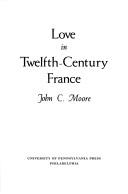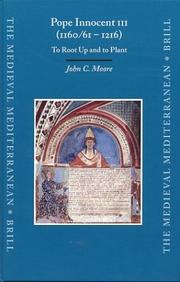| Listing 1 - 10 of 22 | << page >> |
Sort by
|

ISBN: 0812276485 1512804665 Year: 1972 Publisher: Philadelphia, Pa
Abstract | Keywords | Export | Availability | Bookmark
 Loading...
Loading...Choose an application
- Reference Manager
- EndNote
- RefWorks (Direct export to RefWorks)
The definitions of love given by the monks and scholars, the courtly poets and bawdy ballad-writers of medieval France form the substance of this graceful and perceptive book, through a wealth of original sources and scholarly literature.
Old French literature --- Thematology --- anno 1100-1199 --- Love --- -Affection --- Emotions --- First loves --- Friendship --- Intimacy (Psychology) --- History --- -France --- Social life and customs --- -Love --- -History --- -Old French literature --- Pʻŭrangsŭ --- Frankrig --- Francja --- Frant︠s︡ii︠a︡ --- Prantsusmaa --- Francia (Republic) --- Tsarfat --- Tsorfat --- Franḳraykh --- Frankreich --- Fa-kuo --- Faguo --- Франция --- French Republic --- République française --- Peurancih --- Frankryk --- Franse Republiek --- Francland --- Frencisc Cynewīse --- فرنسا --- Faransā --- Franza --- Republica Franzesa --- Gallia (Republic) --- Hyãsia --- Phransiya --- Fransa --- Fransa Respublikası --- Franse --- Францыя --- Frantsyi︠a︡ --- Французская Рэспубліка --- Frantsuzskai︠a︡ Rėspublika --- Parancis --- Pransya --- Franis --- Francuska --- Republika Francuska --- Bro-C'hall --- Френска република --- Frenska republika --- França --- República Francesa --- Pransiya --- Republikang Pranses --- Γαλλία --- Gallia --- Γαλλική Δημοκρατία --- Gallikē Dēmokratia --- فرانسه --- Farānsah --- צרפת --- רפובליקה הצרפתית --- Republiḳah ha-Tsarfatit --- פראנקרייך --- 法国 --- 法蘭西共和國 --- Falanxi Gongheguo --- フランス --- Furansu --- フランス共和国 --- Furansu Kyōwakoku --- Francija --- Ranska --- Frankrike --- Affection --- France --- HISTORY / Medieval.

ISSN: 09285520 ISBN: 9004129251 9786610467150 1423712137 1280467150 9047401891 9789004129252 9781423712138 9789047401896 9780268035143 0268035148 Year: 2003 Volume: 47 Publisher: Leiden Boston Brill
Abstract | Keywords | Export | Availability | Bookmark
 Loading...
Loading...Choose an application
- Reference Manager
- EndNote
- RefWorks (Direct export to RefWorks)
This work is a biography of Pope Innocent III. It offers a balanced portrait of the man and his pontificate, and its chronological organization enables the reader to see how the pope was usually dealing with many different subjects at the same time.
Popes --- 262.13 INNOCENTIUS III --- Holy See --- See, Holy --- Papacy --- 262.13 INNOCENTIUS III Pausschap. Heilige Stoel. Vaticaan. Paus als soeverein--INNOCENTIUS III --- Pausschap. Heilige Stoel. Vaticaan. Paus als soeverein--INNOCENTIUS III --- Innocent III, Pope --- Church history --- Papes --- Papauté --- Eglise --- Biography --- History --- Biographies --- Histoire --- Innocent --- Innocentius --- Innocenz --- Innocenzo --- Innozenz --- Segni, Lotario di, --- Segni, Lothair of, --- de' Conti, Lotario --- dei Segni, Lotario --- dei Conti di Segni, Lotario --- Lotario dei Segni --- Popes - Biography.
Book
ISBN: 3030013197 3030013189 Year: 2019 Publisher: Cham : Springer International Publishing : Imprint: Palgrave Pivot,
Abstract | Keywords | Export | Availability | Bookmark
 Loading...
Loading...Choose an application
- Reference Manager
- EndNote
- RefWorks (Direct export to RefWorks)
In this book, John C. Moore surveys the history of universities, from their origin in the Middle Ages to the present. Universities have survived the disruptive power of the Protestant Reformation, the Scientific, French, and Industrial Revolutions, and the turmoil of two world wars—and they have been exported to every continent through Western imperialism. Moore deftly tells this story in a series of chronological chapters, covering major developments such as the rise of literary humanism and the printing press, the “Berlin model” of universities as research institutions, the growing importance of science and technology, and the global wave of campus activism that rocked the twentieth century. Focusing on significant individuals and global contexts, he highlights how the university has absorbed influences without losing its central traditions. Today, Moore argues, as universities seek corporate solutions to twenty-first-century problems, we must renew our commitment to a higher education that produces not only technicians, but citizens.
Europe-History. --- Civilization-History. --- Education-History. --- Intellectual life-History. --- European History. --- Cultural History. --- History of Education. --- Intellectual Studies. --- Europe—History. --- Civilization—History. --- Education—History. --- Intellectual life—History. --- Europe --- Civilization --- Education --- Intellectual life --- Intellectual History. --- Intellectual history --- Teaching --- Cultural history --- Gay culture Europe --- History. --- History
Book
ISBN: 9783030013196 3030013197 Year: 2019 Publisher: Cham : Springer International Publishing : Imprint: Palgrave Pivot,
Abstract | Keywords | Export | Availability | Bookmark
 Loading...
Loading...Choose an application
- Reference Manager
- EndNote
- RefWorks (Direct export to RefWorks)
In this book, John C. Moore surveys the history of universities, from their origin in the Middle Ages to the present. Universities have survived the disruptive power of the Protestant Reformation, the Scientific, French, and Industrial Revolutions, and the turmoil of two world wars-and they have been exported to every continent through Western imperialism. Moore deftly tells this story in a series of chronological chapters, covering major developments such as the rise of literary humanism and the printing press, the "Berlin model" of universities as research institutions, the growing importance of science and technology, and the global wave of campus activism that rocked the twentieth century. Focusing on significant individuals and global contexts, he highlights how the university has absorbed influences without losing its central traditions. Today, Moore argues, as universities seek corporate solutions to twenty-first-century problems, we must renew our commitment to a higher education that produces not only technicians, but citizens.
Science --- Theory of knowledge --- History of education and educational sciences --- History of civilization --- History --- History of Europe --- intellectuele ontwikkeling --- cultuurgeschiedenis --- geschiedenis --- onderwijs --- protestantisme --- Europese geschiedenis --- Europe --- Civilization --- Education --- Intellectual life --- European History. --- Cultural History. --- History of Education. --- Intellectual History. --- History.
Book
Abstract | Keywords | Export | Availability | Bookmark
 Loading...
Loading...Choose an application
- Reference Manager
- EndNote
- RefWorks (Direct export to RefWorks)
Digital
ISBN: 9783030013196 Year: 2019 Publisher: Cham Springer International Publishing :Imprint: Palgrave Pivot
Abstract | Keywords | Export | Availability | Bookmark
 Loading...
Loading...Choose an application
- Reference Manager
- EndNote
- RefWorks (Direct export to RefWorks)
In this book, John C. Moore surveys the history of universities, from their origin in the Middle Ages to the present. Universities have survived the disruptive power of the Protestant Reformation, the Scientific, French, and Industrial Revolutions, and the turmoil of two world wars—and they have been exported to every continent through Western imperialism. Moore deftly tells this story in a series of chronological chapters, covering major developments such as the rise of literary humanism and the printing press, the “Berlin model” of universities as research institutions, the growing importance of science and technology, and the global wave of campus activism that rocked the twentieth century. Focusing on significant individuals and global contexts, he highlights how the university has absorbed influences without losing its central traditions. Today, Moore argues, as universities seek corporate solutions to twenty-first-century problems, we must renew our commitment to a higher education that produces not only technicians, but citizens.
Science --- Theory of knowledge --- History of education and educational sciences --- History of civilization --- History --- History of Europe --- intellectuele ontwikkeling --- cultuurgeschiedenis --- geschiedenis --- onderwijs --- protestantisme --- Europese geschiedenis --- Europe
Book
Year: 1961 Publisher: Göteborg Gumperts
Abstract | Keywords | Export | Availability | Bookmark
 Loading...
Loading...Choose an application
- Reference Manager
- EndNote
- RefWorks (Direct export to RefWorks)
Book
ISBN: 9781512804669 Year: 2016 Publisher: Philadelphia
Abstract | Keywords | Export | Availability | Bookmark
 Loading...
Loading...Choose an application
- Reference Manager
- EndNote
- RefWorks (Direct export to RefWorks)
Book
ISBN: 1316877256 1316879844 131687186X Year: 2018 Publisher: Cambridge, England : Cambridge University Press,
Abstract | Keywords | Export | Availability | Bookmark
 Loading...
Loading...Choose an application
- Reference Manager
- EndNote
- RefWorks (Direct export to RefWorks)
Presenting new approaches to studying food webs, this book uses practical management and policy examples to demonstrate the theory behind ecosystem management decisions and the broader issue of sustainability. All the information that readers need to use food web analyses as a tool for understanding and quantifying transition processes is provided. Advancing the idea of food webs as complex adaptive systems, readers are challenged to rethink how changes in environmental conditions affect these systems. Beginning with the current state of thinking about community organisation, complexity and stability, the book moves on to focus on the traits of organisms, the adaptive nature of communities and their impacts on ecosystem function. The final section of the book addresses the applications to management and sustainability. By helping to understand the complexities of multispecies networks, this book provides insights into the evolution of organisms and the fate of ecosystems in a changing world.
Digital
ISBN: 9781512804669 9780812276480 Year: 2016 Publisher: Philadelphia, Pa University of Pennsylvania Press
Abstract | Keywords | Export | Availability | Bookmark
 Loading...
Loading...Choose an application
- Reference Manager
- EndNote
- RefWorks (Direct export to RefWorks)
| Listing 1 - 10 of 22 | << page >> |
Sort by
|

 Search
Search Feedback
Feedback About UniCat
About UniCat  Help
Help News
News